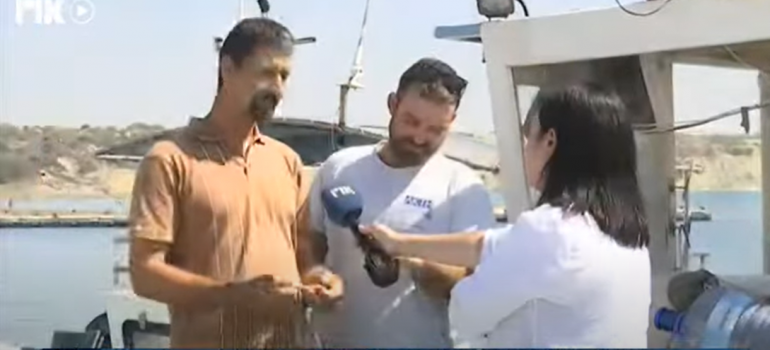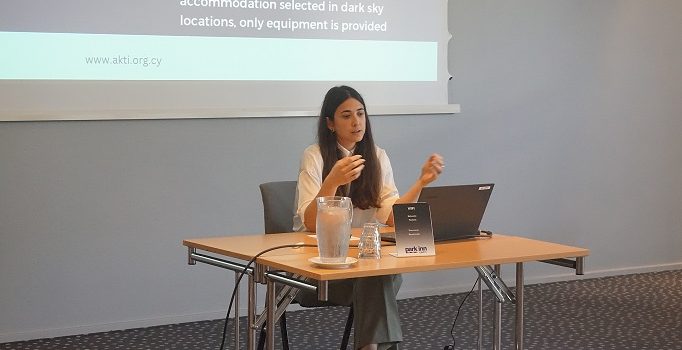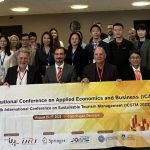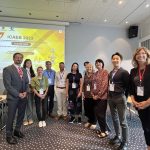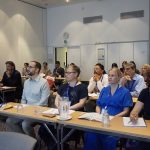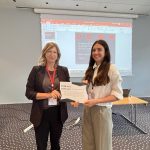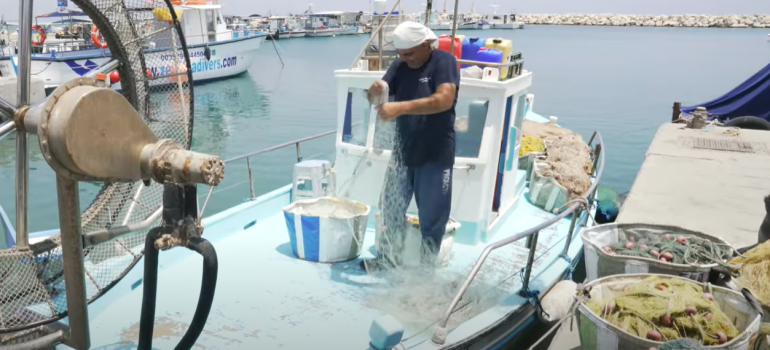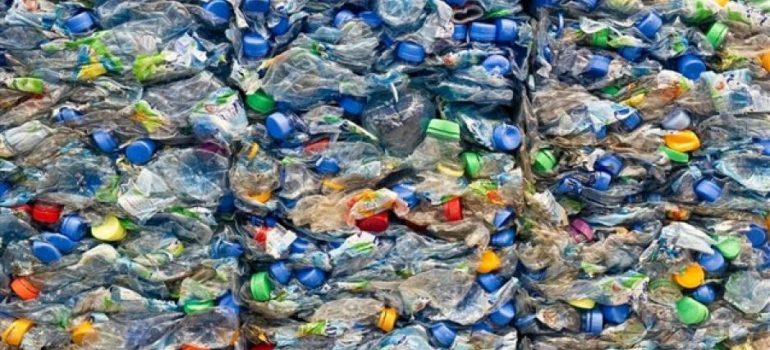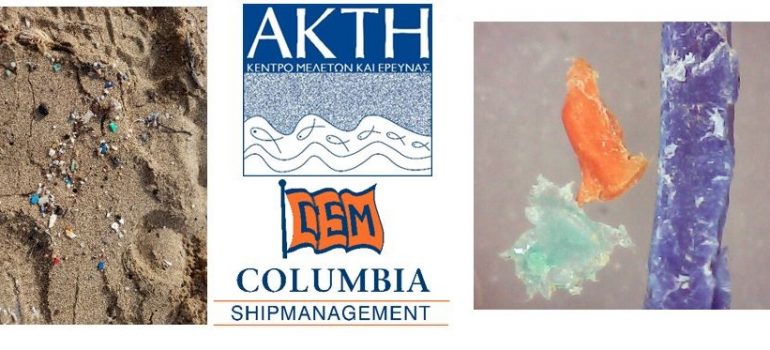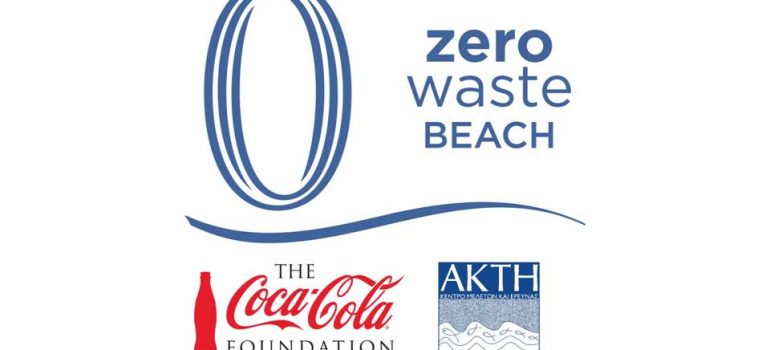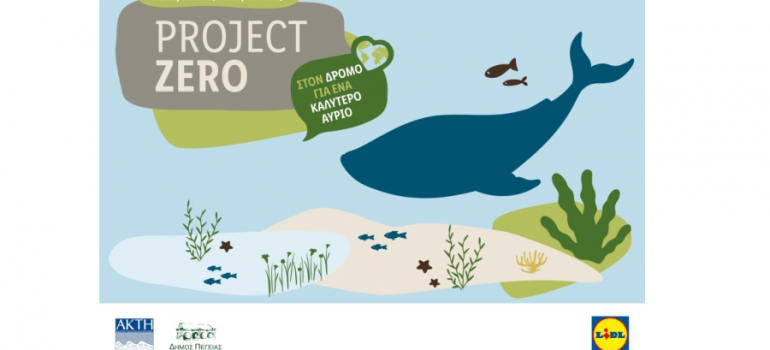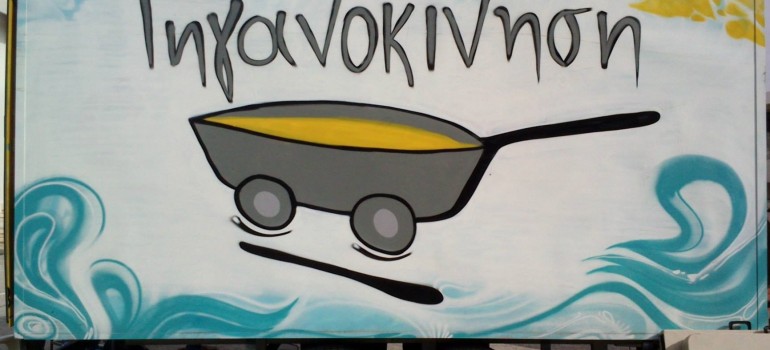Applied Environmental Research
Η ΑΚΤΗ μιλάει για την πλαστική ρύπανση στις Ειδήσεις των 20:00, στο ΡΙΚ
Applied Environmental Research Environmental Education and Vocational Training News Ongoing projectsSep 18th, 20230 comments
Η ομάδα της ΑΚΤΗς φιλοξενήθηκε στο κεντρικό δελτίο ειδήσεων του ΡΙΚ, όπου μιλήσαμε σχετικά με την έρευνα που διεξάγουμε για την καταγραφή της ρύπανσης στις ακτές τις Κύπρου, την πλαστική ρύπανση και τα μικροπλαστικά, και τα αλιευτικά δίκτυα που αναπτύχθηκαν με βάση υλικά βιολογικής προέλευσης, μέσα στα πλαίσια του Ευρωπαικού προγράμματος Ορίζοντας 2020, SEALIVE, τα οποία υποβάλλονται σε δοκιμές στις θάλασσες της Κύπρου από μια ομάδα 10 εθελοντών Κυπρίων ψαράδων.
7th International Conference on Sustainable Tourism Management
Applied Environmental Research Environmental Education and Vocational Training News Ongoing projects Public Outreach and AdvocacySep 1st, 20230 comments
On 26th August one of our team members, Christina Baldwin, presented our Astrotourism project, with the title: “Beyond Stargazing: The Sustainable Astrotourism Framework” at the 7th International Conference on Sustainable Tourism Management in Copenhagen, Denmark. The presentation covered the project itself as well as the sustainability aspects that AKTI developed for the implementation of the Astrotourism activities.
The conference was a great success and Christina won best presentation of her session.
Thank you to the conference organisers for having us!
SEALIVE Fishing Nets Technical Meeting in Cyprus
Applied Environmental Research NewsJul 13th, 20230 comments
On 29 June 2023, partners from the SEALIVE project visited Cyprus to discuss the ongoing pilot implementation of the bio-based fishing nets developed by the SEALIVE project. During their visit they had the opportunity to meet and discuss with fishermen involved in the pilot.
SeaTecHub: Croatia-Cyprus Excellence Hub on Eco-Innovative Technologies for Healthy and Productive Seas
Applied Environmental Research Ongoing projectsJun 28th, 20230 comments
The main goal of the SeaTecHub project is to strengthen Croatian and Cyprus place-based innovation ecosystems and improve access to excellence for R&I actors by cross-border collaboration on a common strategy and alongside value adding chains within the area of eco-innovative technologies for healthy and productive seas, focusing on the sectors of Aquaculture and fisheries, Smart ports, Maritime security and protection, Research and Education, and Maritime technologies, which are aligned with Croatian and Cypriot Smart Specialization Strategies and have been identified as emerging and established sectors in the EU Blue Economy Report 2021.
The objectives of the SeaTecHub project are
1)to facilitate long-term cross border and inter-sectoral collaboration to advance eco-innovative technologies for healthy and productive seas,
2) to perform joint research work to close knowledge gaps, consolidate and reinforce quadruple-helix linkages, and validate strategy and action and investment plans (AIPs),
3) to implement a set of mutual learning and skills development measures, and
4) to raise visibility of Croatian-Cyprus innovation ecosystems by implementing strategic measures in the form of organizing networking, knowledge and experience transfer events.
The SeaTecHub consortium covers the quadruple helix of Croatian and Cyprus ecosystems, including 2 research organizations, 4 public authorities, 5 business actors, 3 NGOs and 49 institutions who expressed their strong willingness to participate and collaborate for the successful implementation of the project activities.
SeaTecHub is a Horizon Europe project implemented through funding by the European Commission under the Horizon Widera Programme Framework.
ΑΚΤΗ: Στα 0,2 τεμάχια ανά τ.μ. άμμου η μέση πυκνότητα σκουπιδιών στην Κύπρο
Applied Environmental Research NewsApr 19th, 20230 comments
Στοιχεία για τα παράκτια θαλάσσια απορρίμματα, τα οποία για πρώτη φορά καλύπτουν ολόκληρη την Κύπρο στη βάση δεδομένων της Ευρωπαϊκής Ένωσης EMODNET, δόθηκαν στη δημοσιότητα, σύμφωνα με την Δρ. Ξένια Ι. Λοϊζίδου, Πρόεδρο του Διοικητικού Συμβουλίου της ΑΚΤΗΣ.
Πρόκειται για 42499 δεδομένα, που συλλέχθηκαν σε 80 δειγματοληψίες από 20 ακτές σε όλη την Κύπρο, από την Καρπασία μέχρι τον Ακάμα. Η συλλογή των στοιχείων, καθώς και η επεξεργασία τους άρχισε το 2020.
«H μέση πυκνότητα των σκουπιδιών στις ακτές μας», είπε η Δρ. Λοϊζίδου, «είναι 0,2 τεμάχια σε κάθε τετραγωνικό μέτρο άμμου! Το 86% των σκουπιδιών είναι πλαστικά, με πρωταγωνιστή τα καπάκια από τις πλαστικές μπουκάλες». Τα στοιχεία συλλέγονται, όπως σημείωσε, με συγκεκριμένη μέθοδο που υποστηρίζεται από την Ευρωπαϊκή Ένωση. Η δράση υποστηρίχθηκε αρχικά από την ΕΕ στο πλαίσιο δικοινοτικού έργου και συνεχίζεται με εθελοντική εργασία από τους δύο μη-κερδοσκοπικούς οργανισμούς, την MASDER και το Κέντρο Μελετών και Έρευνας ΑΚΤΗ, που έχει και την επιστημονική ευθύνη για την έρευνα.
Όπως σημείωσε η Πρόεδρος του ΔΣ της ΑΚΤΗΣ είναι η πρώτη φορά που καταγράφονται συστηματικά στοιχεία για τα θαλάσσια απορρίμματα στην Ανατολική Μεσόγειο και τώρα, «το γεγονός ότι για πρώτη φορά τα στοιχεία από όλη την Κύπρο περιλαμβάνονται στην Ευρωπαϊκή βάση δεδομένων, με την υποστήριξη του Τμήματος Αλιείας και Θαλάσσιων Ερευνών, μας δίνει χαρά και κουράγιο για να συνεχίσουμε».
Περισσότερα εδώ.
Microplastics: Detection on Cyprus beaches sampling and analysis
Applied Environmental ResearchMar 31st, 20230 comments
Microplastics are found everywhere, in the food we eat, the water we drink and according to the latest scientific research, are present even in human lungs. As a result, efforts to minimize their negative effect on the environment and our health are being intensified.
AKTI implements this research project, which is the first of its kind in Cyprus and aims to highlight the detrimental effects of microplastics on the marine environment. It includes sampling at 10 beaches in Cyprus – five popular and five remote during both the summer and winter months and laboratory analysis will be done at the Department of Civil Engineering lab of the University of Cyprus.
With 2022 as the base-line year, these first results will identify the four most microplastic-polluted beaches. These locations will then receive more detailed monitoring, sampling and analysis on the abundancy, and type, of microplastics. The research project will create the first data series of systematic microplastics monitoring in Cyprus.
This field work will provide valuable data to guide the policies against plastic pollution, since it will give the first indication in the eastern Mediterranean of microplastics concentration on beaches. AKTI plans to engage interns, university science students, citizens and volunteers to help with the project.
This project is supported by Columbia Shipmanagement.
Zero Waste Beach in Cyprus. Zero Waste Future in Malta. Net Zero in Cyprus and Malta
Applied Environmental Research Environmental Education and Vocational Training Public Outreach and AdvocacyNov 1st, 20220 comments
Zero Waste Beach and Future projects
Marine litter is an environmental, economic as well as human health problem with no simple solution. It poses a global, complex and multi-dimensional challenge with significant implications for the marine and coastal environment and human activities all over the world. Recovery and recycling of the most common marine litter items, are important steps in halting the inflow of items into the marine environment and are also critical first steps in promoting the Circular Economy. Recovery and recycling are particularly critical in island countries, such as Cyprus and Malta.
To address the problems outlined above, the initiative proposed here aims to engage citizens, students, local authorities and businesses to take ownership of the environment they spend most time in so as to increase recycling and decrease land and marine litter, using the “producer responsibility” mentality, but through soft, awareness-raising and participatory measures.
Activities for Zero Waste Beach Cyprus:
Click here to learn about some exciting news for Cyprus!
🎥 General Actions_Total Results (video_en)
🎥 General Actions_Total Results (video_gr)
📈Infographic_Total Results (2018-2020) (pdf_gr)
1️⃣. Strengthened and expanded the «Responsible Coastal Businesses Network»: to 310 members, through the implementation of an extensive awareness-raising campaign, targeting all coastal businesses on the island. In these campaigns, AKTI’s staff have been liaised with approximately 800 business owners/managers/employees, informing them about marine litter (sources and impacts) as well as about the upcoming European legislation on single-use plastics and how it affects them and assisting them in implementing practices that will minimize their plastic production and thus minimize the potential for marine plastic pollution from their operations and their customers’ activities. The involvement of local authority representatives has added particular clout to this activity.
❓ HOW and WHY to join the Responsible Coastal Businesses Network_EN_(pdf)
❓ HOW and WHY to join the Responsible Coastal Businesses Network_GR_(pdf)
The RCB network members can be viewed in the below map.
To provide inspiration, a Decalogue and a Guide were developed during the last year implementation of the project and distributed to the Coastal Businesses. Decalogue contained 10 basic possible good practices and the Guide contained examples of these good practices in order to inspire the applicants and encourage them to act against plastic pollution and generally for a more green performance of their businesses.
An electronic version of these, are available here:
✅ Examples of Good Practices_gr
2️⃣. Tracked and recorded recycling waste from the Responsible Coastal Businesses: The members of the Responsible Coastal Businesses Network ought, as a mandatory term of their network membership, to record the amount of recyclable waste (PMD, glass, general) that they dispose. 980 tons of recycling waste collected by the responsible coastal businesses throughout the duration of the project. This has been monitored with regular visits by AKTI’s group of experts, who also provided their suggestions on how the business can become more effective in recycling. In this way, they will be able to set goals and monitor their reduction in the long run, as a result of the implementation of plastic reducing practices.
3️⃣. Beach cleanups in conjunction with the International Coastal Cleanup: AKTI implemented annual beach cleanups on selected beaches with the collaboration of the Responsible Coastal Businesses, local authorities, schools, and volunteers.
AKTI is the national coordinator of the International Coastal Cleanup of the Ocean Conservancy in Cyprus. Therefore, all the cleanups implemented using the International Coastal Cleanup Protocol. The data included in the Regional Marine Litter Database and has also be submitted to the ICC.
📸🌊Some photos from the Beach and Seabed Cleanups, are available here: 1 & 2 & 3 & 4 & 5
🎥🌊Some Videos from the Beach and Seabed Cleanups:
video 1___video 2___video 3___video 4___video 5
video 6___video 7___video 8___video 9___video 10
4️⃣. Tracked and recorded recycling waste from the Responsible Coastal Businesses, on-the-go recycle bins and events : 980 tons of recycling waste collected in Cyprus by coastal businesses-members of the Network throughout the duration of the project, of which, the percentage per source of total recyclable waste, were 46% Paper, 30% PMD and 24% Glass. In these 980 tons of recycling waste collected from the coastal businesses, the 130 tons correspond to PET.
This has been monitored with regular visits by AKTI’s group of experts, who also
provided their suggestions on how the business can become more effective in
recycling. In this way, they will be able to set goals and monitor their reduction in the
long run, as a result of the implementation of plastic reducing practices.
17 tons of recyclable waste was collected from these bins during the implementation
period of the project. The aim was to encourage local authorities and communities to
improve collection infrastructure and implement reduction actions for plastics used.
Source identification activity was performed for this action. AKTI’s staff separated
the collected waste per source, to create an innovative database with data that can be
used for directing budget to the management of the most frequent litter.
📸♻️More information and photos about “On-the-go recycling” research action, can be found here.
5️⃣. Α Competition for the implementation of sustainable practices to reduce marine litter, and especially plastics, was launched and implemented. The Competition targeted members of the Responsible Coastal Businesses Network, in an attempt to promote sustainable practices incorporated by coastal businesses in their operation, and to minimize plastic waste entering the coastal and marine environment, thus mitigating/reducing the pollution they cause. Τhe terms for the participation in the Competition and the application form distributed to the Coastal Businesses along with a Decalogue and a good practices Guide, in order to inspire the applicants and encourage them to act against plastic pollution and generally for a more green performance of their businesses. 390 entries/good practices were received. The entries were evaluated by a five-member independent jury: the Chairperson of the Board of Directors of AKTI, Dr. Xenia I. Loizidou, the Media Relations Director at Digital Tree, Mrs Xenia Xenophontos, the Corporate Affairs and Sustainability Manager at Coca-Cola HBC Cyprus, Mrs Melina Limnati and the two members of AKTI, Mrs Anna Tselepou and Ms Maria-Christina Constantinou. The winners were selected by the jury followings a selection process based on 4 criteria: environmental responsibility, social responsibility, innovation and sustainability and the awards are given in two categories, depending on the type – size of the business.
6️⃣. A highly publicised Award Ceremony, “Zero Waste Beach Awards 2023”, was implemented at the end of the project. The winners had the title of «Zero Waste Beach Champions 2023». The ceremony took place in June 22 at Old Powerhouse in Nicosia. The ceremony attended by 72 people, including the General Director of the Ministry of Agriculture, Rural Development and Environment Mr Andreas Georgiou, , the General Director of the Deputy Ministry of Tourism Mr. Antonis Koutsoullis, the Director of Department of the Environment Mrs Elena Stylianopoulou, the president of the Parliamentary Environment Committee MP Mr. Charalambos Theopemptou, the Mayor of Nicosia Mr Constantinos Yiorkatzis, the president of the ‘Cyprus Hotels Association’ Mr E. Loizides, several NGOs, HoReCa representatives, media (TV, radios and newspapers/e-media), Trade Unions, Thirdparty experts, Tour Agents, Environmental Parliamentary Committee and other stakeholders. The Ceremony was extensively covered by local and national media (TVs, radios and newspapers).
The awards are given in two categories, depending on the type of the business (large or small businesses) .The six championships were distinguished in the categories of environmental responsibility, sustainability, innovation and social responsibility.
In the category of large businesses:
🏆 Aliathon Resort received the Sustainability Award
🏆 St. Raphael Resort & Marina received the Innovation Award,
🏆 Capo Bay Hotel received the Social Responsibility Award and,
🏆 Atlantica Aeneas Resort received the Environmental Responsibility Award.
In the category of small businesses:
🏆 Grape by the Sea received the Sustainability Award,
🏆 Klimataria-Beach Bar Resto received the Sustainability Award.
🏆 Avli tis Nefelis received the Innovation Award
🏆Charalambos Holiday Cottage received the Social Responsibility Award.
🏆 Aplostra Beach Bar received the Environmental Responsibility Award.
Special thanks were given to one person to whom the success of Zero Waste beach is owed.
🏅 Anna Tselepou of AKTI
📸Some photos from the Zero Waste Beach Awards, are available for 2019 here. And 2021-2022 here.
🎥Some Videos from the “Zero Waste Beach Awards 2019”:
Video 1___Video 2___Video 3___Video 4
7️⃣. Extensive communication and dissemination activities took place over the duration of the project, and especially at times with important activities, e.g. the project launch, the cleanup events, the competition and the awards ceremony. Communication and dissemination activities were inclusive all means and media (print, online, social etc), and 6,642,737 people reached via AKTI’s social media.
Activities for Zero Waste Future Malta:
Click here to learn about some exciting news for Malta!
1️⃣. Waste characterization: this activity was carried out in the Three Cities of Malta (Cottonera) to identify the main types of waste disposed of and their relative percentages, depending on the type of establishment. This activity provides a solid base of waste data and indicate where efforts must be focused for more effective recycling. The waste characterisation study was carried out by AKTI’s experts, with the strong support of the councils of the Three Cities of Malta/Cottonera. Waste was sampled from at least 66 sampling points,for 3 sampling sessions.The involvement of 3 local authority representatives has added particular value to this activity. More specifically Birgu Municipality, Cospicua and Senglea (The Three Cities of Malta) had Council meetings on the issue and decided to support the implementation of the
Network in all HoReCa establishments within their territory.
🎥Some Videos from “Waste Characterization” action:
📸Some photos from the “Waste Characterization”, are available here.
2️⃣. Build on the “Responsible Coastal Businesses Network in Malta: through extensive awareness-raising campaigns, where representatives of the Coca-Cola Company of Malta, informing business owners/managers about marine litter (sources and impacts) as well as about the upcoming European legislation on single-use plastics and how it affects them, and assisting them in implementing practices that will minimize their plastic production and thus minimize the potential for marine plastic pollution from their operations and their customers’ activities.The Responsible Coastal Businesses Network Ambassadors have liaised with 50 business owners/managers/employees. The below shows the network members inducted until now.
To provide inspiration, a Decalogue and a Guide were developed during the last year implementation of the project and distributed to the Coastal Businesses. Decalogue contained 10 basic possible good practices and the Guide contained examples of these good practices in order to inspire the applicants and encourage them to act against plastic pollution and generally for a more green performance of their businesses.
An electronic version of these, are available here:
✅ Examples of Good Practices_en
3️⃣Tracked and recorded recycling waste from the Responsible Coastal Businesses, on the-go recycling bins, and events: 46.1 tonnes of recycling waste collected from the Responsible Coastal Business Network. Of the 46.1 tonnes of recycling waste collected, 31.4 tonnes were PET, making PET waste 68% of the total recyclable waste collected.
In order to succeed the collection of any possible PMD which is not disposed in the DRS machines, we cooperated with event organizers such as Festivals Malta and Sports Malta in order to install PMD bins during the events. The Zero Waste Future bins were installed in the following events, collecting 17 tonnes of recyclable waste of which 14.5 tonnes were PET:
• Notte Bianca
• Sports Malta Family Day Open Event
• Festivals Malta NYE Event
4️⃣. Beach cleanups in conjunction with the International Coastal Cleanup: annual beach cleanups on selected beaches with the collaboration of NGOs, local authorities, schools, and volunteers. All the cleanups were implemented using the International Coastal Cleanup Protocol in order to be able to identify the sources of the collected litter and to begin compiling data on beach marine litter in Malta. The data were included in the Regional Marine Litter Database and will also submitted to the ICC.
🎥🌊Some Videos from “Beach/Seabed Cleanups and Turtle Release”:
📸🌊Some photos from the Beach and Seabed Cleanups, are available here.
5️⃣. Zero Waste Champions Competition: 24 entries to the Competition.The competition aims at rewarding and recognising those members of the Network who have taken substantial and / or innovative measures to minimise their contribution to the marine litter problem and minimise the use of plastics. Specific criteria and entries were evaluated by an independent jury of experts to announce the ZERO WASTE FUTURE CHAMPIONS! The final event, which is also the Award Ceremony, was completed on the 2nd of June 2023. The event was hosted at Malta Aquarium, one of the Network’s members, and saw the participation of over 200 participants, including school children, representatives of the Ministry of Education, Local Authorities, Members of the Network etc. The welcome speech was presented by the Ministeer of Environment Ms Miriam Dalli. The implementation of the event this year, alongside schools that implement the Eco-Schools’ Litterless Campaign, and hosted by the
Malta Aquarium, Member of our RCB Network. The awards were presented to the following HoReCa who cooperated with the schools to promote the Zero Waste concept through implementation of solutions:
• Talbot & Bons Restaurant
• Talbot & Bons Boutique Hotel
• Costa Coffee
• Manouche
• St. Thomas Moore Tuckshop
• St. Micheals Tuckshop
6️⃣. Extensive communication and dissemination activities took place over the duration of the project, and especially at times with important activities, e.g. , the cleanup events, waste characterization activities etc. 4,600,000 people reached through Communication and dissemination activities were inclusive all means and media (print, online, social etc).
LIDL: PROJECT ZERO & PLASTIC FREE – Στο δρόμο για ένα καλύτερο αύριο
Applied Environmental Research Environmental Education and Vocational Training Public Outreach and AdvocacyOct 16th, 20220 comments































TIGANOKINISI: turning domestic used cooking oil into biodiesel
Applied Environmental Research Environmental Education and Vocational Training Public Outreach and AdvocacyMay 1st, 20220 comments
Turning a harmful waste, such as cooking oil, into biodiesel while promoting development and civic action
Continue Reading
Urban Sustainability
Applied Environmental ResearchSep 1st, 20210 comments
Climate Change impacts in Cyprus’ Cities are significant. The need to build urban resilience is imperative, at a bicommunal level, both in south and north. Through a novel, participatory, solution-oriented decision support process, we aim to develop policy tools and a roadmap for implementing solutions. We aim to enhance the awareness of society through participation, developing the feeling of ownership and long-term commitment through the development of the alumni group #TogetherForOurCities. The project is structured around three workshops, 2 mini-workshops one in the south, one in the north followed by a Final Workshop. The major target groups are decision makers and citizens, local Authorities, teenagers/youth, educators and professionals, e.g. urban planners, landscapers, tourism. This activity will initiate the involvement of this wide spectrum of citizens in the effort to build city resilience around the three main pillars: urban green, sustainable mobility, and nature-based solutions. Each workshop will include training/capacity building and a special “smart” session of a participatory and decision support process to identify gaps-needs-suggestions. The experts will be both Turkish and Greek Cypriots. A British expert will be invited for the Final Workshop, where results will be combined, prioritized and will lead to the policy tool and the road map.
The Urban Sustainability Project will run from September 2021 to March 2022, is supported by the British High Commission in Cyprus and is funded as part of the International Programme Fund of the Foreign, Commonwealth and Development Office.
Archives



